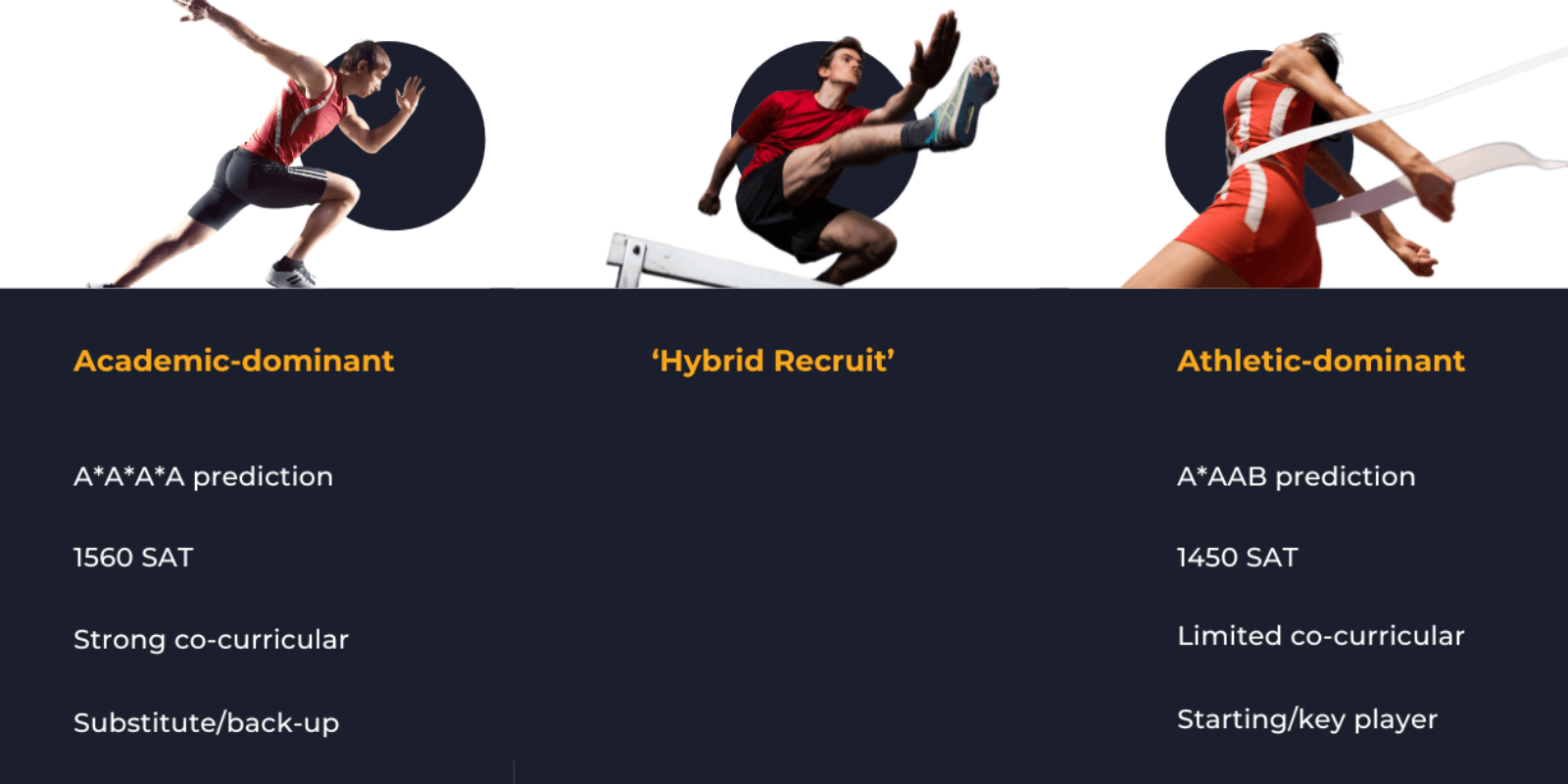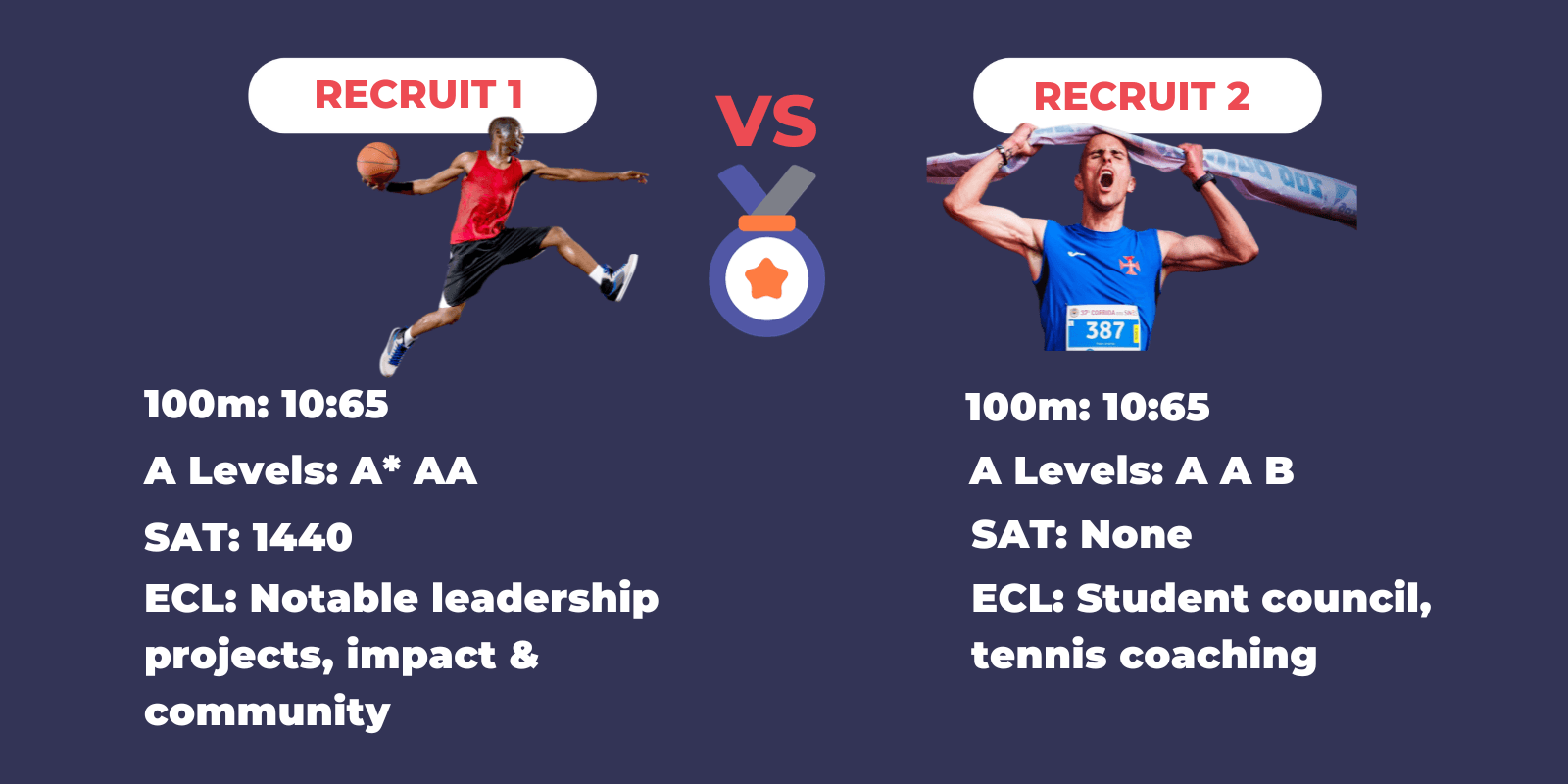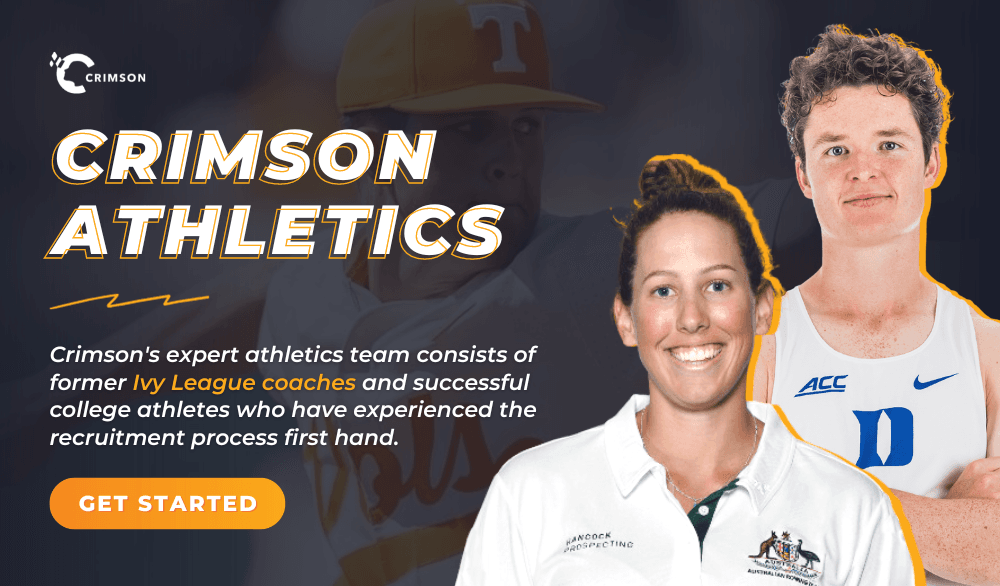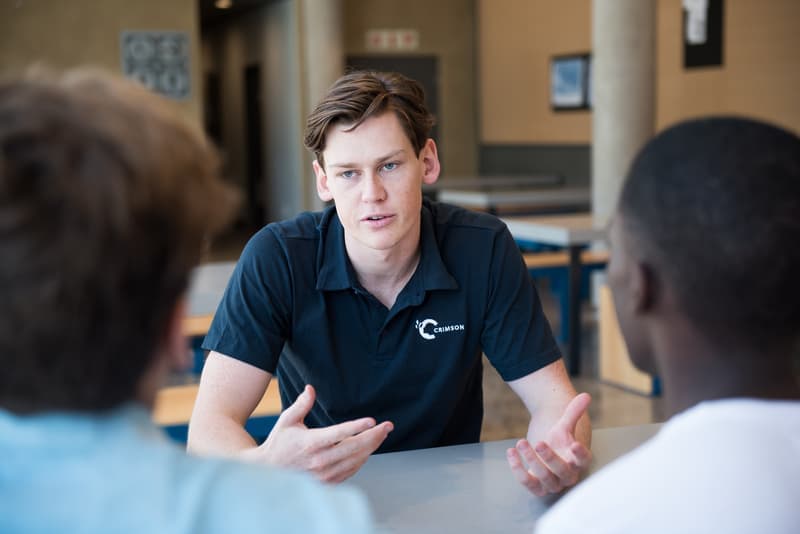Athletic Recruitment to Top US Colleges for UK Students

Summary
Are you a UK student aspiring to be a student-athlete at a US college? Discover the journey of athletic recruitment from the UK to top US colleges. Uncover the intricate process, essential expectations, and key factors elevating your admission prospects to Ivy League and other elite institutions. Acquire insights into academic requirements, the role of coaches, and admission evaluations. Crimson Athletics offers tailored support strategies to maximise your athletic and academic aspirations and guides you through the fiercely competitive recruitment process. Enhance your candidacy and open the doors to an extraordinary academic and sporting journey in the US. Discover how Crimson Athletics can help you to achieve your goals.
The opportunity: Sport can enable access to top colleges in the United States, including the renowned institutions of the Ivy League.
The reality: sport alone does not enable access to top colleges in the United States, including the renowned institutions of the Ivy League.
This blog provides you with an understanding of how sports recruitment to Ivy League and top universities operates as a UK student. After reading, you will learn what recruitment means in selective colleges, and which enabling factors boost admission chances to your dream colleges via sports recruitment.
What is Sports Recruitment and Why Candidacy Building Matters
Baseline Expectations
A recruitment plan will most often include a strategy for tournaments, ID events and showcases, coach communication, profile and video creation. You have to do this in line with coaches’ recruitment timelines. By the time coach conversations happen (within years 11-13), you will have been sending recruitment videos to showcase your talents, and sending persuasive appeals. Then, you can begin successfully navigating the offer and scholarship system ahead of submitting a successful application.
These are the minimum expectations for placement in your sport of interest. If you have lofty ambitions or want to play sports at globally leading universities, you must understand the enabling factors for recruitment at academically selective institutions.
Defining Recruitment
Recruitment simply refers to coach support in the admission process, with a view to having the student join their team. This can be in the form of full support; hard-to-come-by spaces where a coach provides security that admissions will let you in or; partial support, whereby the coach’s advocacy for you increases your chances of acceptance by a certain margin.
At a given college, a recruit can be characterised as academically strong, athletically strong, or a hybrid. Each year, coaches are incentivised to bring in a range of these ‘recruit types’; the balance depends on their school, current roster, guidance from admissions officers, etc. The Harvard Football coach will have an academic performance level (scored as GPA) he wants his team to meet; this might be lower than the level the Dartmouth Cross-Country coach needs. Within these respective teams, some players and athletes will be faster/better players, and others stronger academically.
Recruit Spectrum and Indicative Profiles - Ivy League Colleges

TIP: Identifying what kind of recruit you can be for your dream schools, enables you to create an action plan to stand out and gain influence.
What Do I Need Academically, for Recruitment to Selective Colleges?
Academically, there are prerequisites for being a viable recruit in the full or partial sense. You have to have the relevant NCAA core courses and meet the university’s requirements for academic and perhaps standardised testing. In the UK, generally, you need to be 8s and 9s at GCSE, then on track for at least As at A-Level, to be considered at the top 50 colleges. On IB, this would be 6s and above.
Note, that even a very strong recruit must plan to meet or exceed institutional guidelines for academic standards on incoming students. Yes, it remains generally true that for top colleges, the very best recruits can be a little worse academically, and the weaker recruits have to be very strong academically. But the Yale tennis coach cannot recruit a student with mainly Bs and Cs, even if they won Junior Wimbledon.
Interestingly, in the 2023/24 app cycle, we have seen Ivy League colleges upping their parameters for the academic metrics of incoming international students. The A-Level system is well-understood by US coaches in the top 50 colleges, but standardised testing can still be a fantastic way to demonstrate alignment with academic requirements, especially if your grades are not in the very top bracket. For instance, if you have AAAA projections at A-Level, but very strong quantitative skills, earning a 780+ on SAT Math will serve you well in applying to target STEM pathways in the top 50.
The ‘Pre-Read’
If you are initially deemed academically qualified, and the coach wants to recruit you to their program, they will often put you through a ‘pre-read’ the summer before you apply. This enables the coach to get a read from admissions on whether your candidacy is viable. The mechanics of the pre-read are different at different colleges, but it’s an important milestone to prepare for.
Holistic Admission: Why it Matters for Recruits
All applications will be assessed holistically.
Components of US Application:
If you are pursuing elite colleges like the ‘Ivy+’ group or academically competitive colleges, the bar is raised higher in all these candidacy areas. Simply put: if you gain a stronger candidacy, coaches are more likely to offer support, and admissions are more likely to accept you.
For coaches, this is because they want to know you can handle the workload, and also that they’ll need less to sway admissions when advocating for you, so it is easier to add you to their recruiting list. Certain college coaches look for specific traits to gauge recruitability. For example, Caltech and MIT recruits will need a track record of engineering projects, skills, and leadership strengths relevant to their academic ambitions.
Which Recruit Would a Coach Go With?

Before the admission committee, even with coach support, recruits compete globally against other students on academic rigour and performance, extra-curriculars, academic enrichment, the cohesion of candidacy, fit for university, quality of essays, alignment and strength of recommendations, and more.
One Crimson student this year was told by a Duke coach that, although there were no full support spaces available, given the student’s academic and leadership qualities, the coach could extend a letter of support in admissions. This circumstance is more common than people may be aware of at elite colleges. Therefore, we know the Duke committee will be scrutinising their honours/awards, co-curricular accomplishments, and essays, to make a decision on whether they will have a spot to play their sport there. In simple terms, the strength of their admission chances = strength of coach support + quality of application.
Conclusion
Many factors matter in the recruitment process to top colleges.
| Factors Impacting Your Recruitment Prospects |
|---|
| Taking Stock: Factors Impacting Your Recruitment Prospects |
| Recruitment strategy: tournaments, events and ID camps, video profile and narrative, identifying colleges, coach outreach, negotiating offers, etc. |
| Academic courses: sufficient rigour and performance level for goal colleges |
| Extra-curricular activities: leadership and impact, academic enrichment |
| Honours and awards that stand out |
| Standardised testing where beneficial |
| Well-fit candidacy for universities that match your profile |
How you spend your time will depend on what your existing profile is, and where you want to get to. Fundamentally, if you strengthen your candidacy, coaches are more likely to bring you forward in their recruitment process, and universities are more likely to accept you.
Ps., the more time over which you execute a strategy, the more control you will have on your outcomes. Let’s get to work!
How Crimson Helps
At Crimson Athletics, we devise a unique recruitment strategy for each athlete that aligns with their individual priorities.
Each athlete’s circumstance is different. As such, each athlete’s recruitment strategy should be unique. At Crimson, we can combine our intensive, personalised athletic development and recruitment strategy with our elite college admissions consulting services to ensure that our athletes achieve their goals in the admissions process. From the outset, we work with athletes and their families to understand their athletic goals, academic ambitions, financial needs, and any other priorities that they have, and then we devise a strategy that intentionally addresses these priorities.
If you’re unsure you have everything you need, contact one of our academic advisors at Crimson Education. They will walk alongside you and help you navigate the journey. Let’s work together to achieve your academic and sporting dreams!




